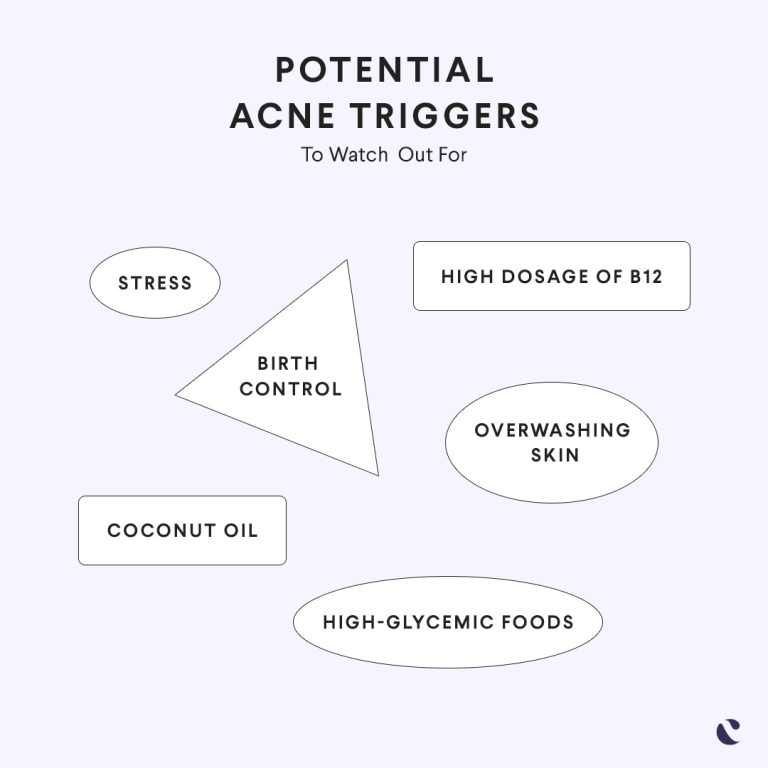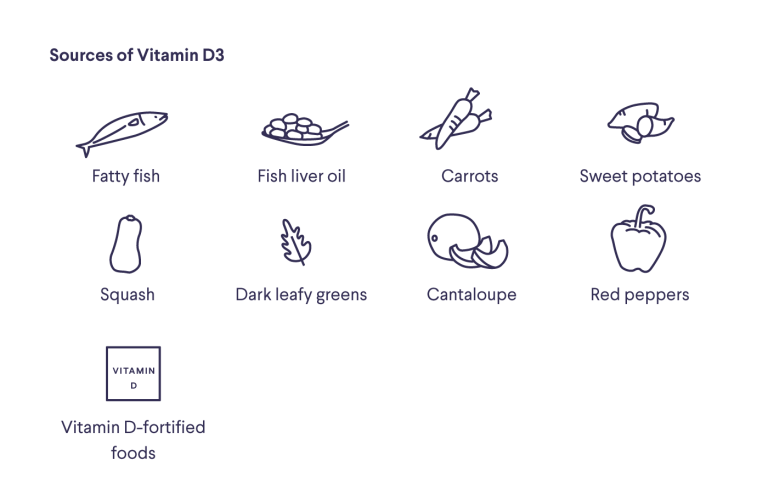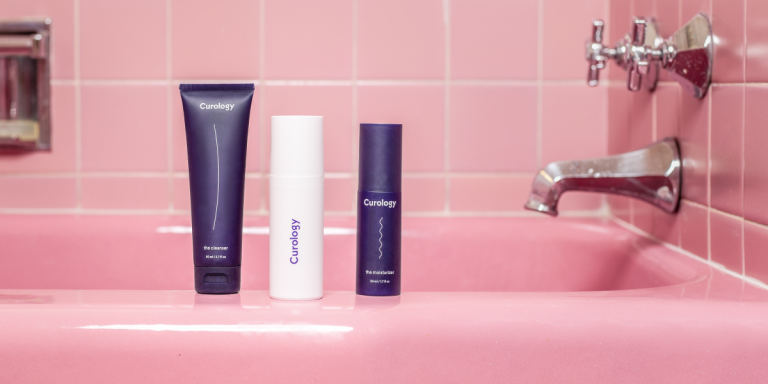How it works:
Share your skin goals and snap selfies
Your dermatology provider prescribes your formula
Apply nightly for happy, healthy skin
How it works:
How it works:
Share your skin goals and snap selfies
Your dermatology provider prescribes your formula
Apply nightly for happy, healthy skin
How it works:
What exactly causes acne?
To help prevent pesky pimples, learn what can cause them to pop up in the first place.



Acne is a very common skin condition that affects both teenagers and adults. Even though it’s a small four-letter word, it’s a broad term that applies to many different types of blemishes, from whiteheads and blackheads to pimples and cysts. Multiple potential triggers can contribute to pimples popping up, including hormones, stress, diet, and even genetics. Knowing what’s at the root of your acne really comes down to your body’s uniqueness. If you’re hoping to learn how to prevent future breakouts, we’re here to help you. As skincare experts, you can take it from us: The journey of learning how to do so begins with discovering what causes your pimples to pop up in the first place.

So what exactly are some of the common causes of acne?
Hormones
Let’s start with an easy one: hormones. One of the most common types of acne, hormonal acne — which often appears on the jawline, chin, and cheeks¹ — can occur with the menstrual cycle, puberty, pregnancy, and even menopause. It’s probably no surprise that your lifestyle can affect your hormones. We totally understand that sometimes life’s curveballs are inevitable. The good news? Treating hormonal acne is possible with Curology. The custom mix of active ingredients in your Custom Formula specifically caters to your unique skin to help keep your skin clear. Our providers can also prescribe an oral medication, spironolactone, that directly targets the hormonal aspect of breakouts.
The hormone fluctuations that naturally occur throughout the menstrual cycle can contribute to premenstrual acne or “period breakouts.” Some people who have periods break out during the premenstrual period and during menstruation. During the first half of the menstrual cycle, estrogen is the predominant hormone. Estrogen has been shown to have a positive effect on acne—reducing breakouts. During the second half of the cycle, progesterone is the predominant hormone. Progesterone can stimulate sebum production which may contribute to breakouts. Towards the end of the cycle, levels of estrogen and progesterone decrease, while testosterone (male androgen hormone) levels stay the same. This hormone shift can lead the skin to produce even more sebum.²,³
Androgens (such as testosterone) play a particularly important role in acne development. We all produce androgens, regardless of biology, but some of us naturally produce higher levels (androgens are often referred to as “male hormones”). An increase in androgens can cause your skin to produce more oil⁴, which isn’t necessarily a bad thing — until you’re dealing with clogged pores. A combo of oil and dead skin cells can get trapped when and clog up pores, and the bacteria that contribute to acne (C. acnes) thrive in the excess oil.⁵
Diet
Foods that can trigger acne in some people include anything with a high-glycemic index (including simple carbs sugar). When your blood sugar spikes, your body produces insulin, a hormone that helps your body control blood glucose levels. Studies show that the increase in insulin influences the skin to produce more sebum (oil), which can trigger acne.⁶

Does milk cause acne?
Milk contains the precursor to certain hormones that can lead to acne, and certain types of dairy (especially skim milk) has been linked to acne in recent studies.⁷ We’re not saying dairy is inherently bad—it doesn’t necessarily contribute to acne for everyone. But if you continue to experience breakouts, it may be worth trying to cut dairy from your diet for a few months to see how your skin responds.
For more info on how dairy might be related to acne, check out our Diet Guide.

Does alcohol cause acne?
Drinking alcohol can be like combining the effects of too much sugar with too much stress. Stress can cause the body to release hormones that stimulate the oil glands, which may lead to acne.⁸ Drinking might help you feel relaxed, but physically speaking, it can actually stress your body out. As always, moderation (and rehydration!) is key.
Stress
Stress pimples or stress bumps can happen because the hormones released when you're stressed out can trigger oil production and lead to breakouts.⁹ The best way to avoid breakouts related to stress is to manage your stress (easier said than done, right?). But really, anything that you can do to reduce your stress, such as practicing meditation and/or yoga once a day, and getting a good 7 or 8 hours of beauty sleep, can make a big difference.
Birth control
For some, birth control can help get acne under control, but for others, it can make breakouts worse. The key factor? The type of hormones in your birth control. We made you this easy tool so you can find out what kinds of hormonal birth control are most likely to contribute to acne.
Makeup, hair, and skincare products
Certain products you are using might be behind breakouts if they contain pore-clogging ingredients.
To help minimize this from happening, use non-comedogenic skincare products — although there’s no official regulation of this term, so you always want to carefully read the ingredients of your products anyway. Check out our quick tutorial to learn how to catch any product for potentially acne-triggering or skin-irritating ingredients.
If you’re experiencing forehead acne, check out the ingredients in your shampoo, conditioner, and any other hair products you use. Try switching to a sulfate-free shampoo since sodium lauryl sulfate (aka sodium laureth sulfate) is often linked to acne.
Are you getting your vitamins?
Vitamin D deficiency
Taking vitamin D for acne may be beneficial, as some studies suggests that low levels of vitamin D may be connected to acne.¹⁰ Vitamin D supplements may be helpful, in addition to getting your daily D from the food you eat. (Mythbuster moment: the sun is actually not the best source of vitamin D, so always apply and reapply that SPF!)

Vitamin A for acne
High doses of vitamin A can help acne. For example, isotretinoin (formerly known by the brand name Accutane) is a vitamin A derivative, but this treatment should be prescribed and monitored by an in-person dermatologist.
The FDA recommends that adult males should get about 3,000 IU a day of vitamin A and women should get about 2,333 IU, preferably from your food. Avoid taking supplements with high doses of A, as excessive intake could cause side effects, including visual problems, nausea, and vomiting. Those who are pregnant should be careful to avoid high doses of vitamin A.¹¹ Make sure to talk to your medical provider before making any changes to your diet!
Zinc for acne
Zinc may also be helpful—it hasn’t been proven, but some studies have shown lower zinc levels in acne patients, especially those with more severe acne.¹²
Other possible acne causes
It might be your medications
Some vitamins or medications may have the side effect of worsening acne. Most people aren't sensitive to this, but some individuals break out with high doses of B12.¹³ Ask your doctor or look at the side effects listed to determine if you might be taking one of the medications that can cause acne. Of course, if you have to keep taking the medication, using a topical treatment like Curology can help minimize those breakouts!
It might be genetics (sorry!)
Is acne genetic? Possibly. Some studies show a correlation when a person’s parents have a history of acne.¹⁴ If this is the case, you can still do your best to control other factors (stress, diet, etc.) and use a treatment like Curology that’s right for you and your skin.
It may be due to a medical condition
Certain medical conditions, such as Polycystic Ovary Syndrome (PCOS), can have symptoms such as hormone imbalance that can contribute to acne. PCOS symptoms include acne, excessive hair growth, and irregular periods.¹⁵ If you think you may have signs that indicate hormonal problems, schedule an evaluation with your primary care provider or OBGYN.
What are some potential acne treatments?
When it comes to acne, there are just as many treatment options as there are potential causes, so don’t worry. There’s no one perfect acne treatment for everyone, but acne is very treatable, and with some persistence (and medically-backed ingredients), you should be able to find a good option for your unique skin.
Benzoyl peroxide. You can find benzoyl peroxide in products such as face cleansers or spot treatments. Benzoyl peroxide can treat inflammatory acne such as papules, pustules, and cysts because it targets C. acnes, the bacteria that contributes to acne inflammation.¹⁶
Topical antibiotics. A dermatologist may prescribe topical antibiotics such as clindamycin to treat acne lesions.¹⁷
Retinoids. Topical retinoids like tretinoin are another key acne treatment available through a prescription.
Oral medication. There are also oral medications that can be taken for acne vulgaris, particularly with severe acne, such as isotretinoin and oral antibiotics.
Salicylic acid. An exfoliating ingredient that can help unclog pores and fight comedones such as blackheads and whiteheads, salicylic acid is another over-the-counter topical option.
When to see a medical provider
There are many different types of acne, and some, such as cysts and nodules, can leave acne scars. If over-the-counter treatment isn't working, or you’re worried about scarring, a medical provider can help you find the right acne treatment for your unique skin and provide more insights into the type or types of acne you’re experiencing.

The simple solution
Depending on the cause of your acne, Curology’s dermatology providers can prescribe a custom treatment to help clear and prevent future breakouts. Curology is a skincare service designed by dermatologists that allows you to access acne experts to help create a routine that's for you. Try Curology free by taking a quick skin quiz and snapping a few selfies. One of our dermatology providers will review your info and, if Curology is right for you, prescribe your Custom Formula alongside recommendations for other products to try (like our acne body wash or micellar makeup remover).
Get your personalized skincare routine with Curology
Get your personalized skincare routine with Curology


We know how stressful acne can be, and that's why we’re here to do the hard work to help you achieve happier, healthier skin. Sign up for your free trial month and give it a try!
FAQs
Milk contains the precursor to certain hormones that can lead to acne, and certain types of dairy (especially skim milk) have been linked to acne in recent studies. It doesn’t necessarily contribute to acne for everyone. For more info on how dairy might be related to acne, check out our Diet Guide.
Drinking alcohol can be like combining the effects of too much sugar with too much stress. Stress can cause the body to release hormones that stimulate the oil glands, which may lead to acne. As always, moderation (and rehydration!) is key.
There’s no one perfect acne treatment for everyone, but acne is very treatable.
Benzoyl peroxide. Can treat inflammatory acne such as papules, pustules, and cysts.
Topical antibiotics. Such as clindamycin to treat acne lesions.
Retinoids. Topical retinoids like tretinoin are another key acne treatment available through a prescription.
Oral medication. Oral medications that can be taken for acne vulgaris, particularly with severe acne, such as isotretinoin and oral antibiotics.
Salicylic acid. An exfoliating ingredient that can help unclog pores and fight comedones such as blackheads and whiteheads.
P.S. We did the research so you don't have to:
Elsaie, Mohamed L. Hormonal treatment of acne vulgaris: an update.Clinical, cosmetic and investigational dermatology.( September 2016).
Elsaie, Mohamed L. Hormonal treatment of acne vulgaris: an update.Clinical, cosmetic and investigational dermatology. Ibid.
Reed, B. G., & Carr, B. R. The Normal Menstrual Cycle and the Control of Ovulation. In K. R. Feingold (Eds.) et. al., Endotext. MDText.com, Inc. (2018).
Elsaie, Mohamed L. Hormonal treatment of acne vulgaris: an update. Clinical, cosmetic and investigational dermatology. Ibid.
Toyoda, M., & Morohashi, M. Pathogenesis of acne. Medical electron microscopy : official journal of the Clinical Electron Microscopy Society of Japan. (2001).
Alicja Kucharska, Agnieszka Szmurło, Beata Sińska. Significance of diet in treated and untreated acne vulgaris.Postepy Dermatol Alergol. (April 2016).
Kucharska, A., Szmurło, A., & Sińska, B. Significance of diet in treated and untreated acne vulgaris. Postepy dermatologii i alergologii. (April 2016).
Chen, Y., & Lyga, J. Brain-skin connection: stress, inflammation and skin aging. Inflammation & allergy drug targets. (2014).
Yosipovitch, Gil et al. Study of psychological stress, sebum production and acne vulgaris in adolescents. Acta dermato-venereologica. (2007 n.d.).
Yildizgören, M. T., & Togral, A. K. Preliminary evidence for vitamin D deficiency in nodulocystic acne.Dermato-endocrinology. (2015, January 14).
National Institutes of Health. Vitamin A and Carotenoids. (2022).
Ozuguz, Pinar et al. Evaluation of serum vitamins A and E and zinc levels according to the severity of acne vulgaris. Cutaneous and ocular toxicology. Ibid.
Zamil, Dina H et al. Acne related to dietary supplements. Dermatology Online Journal. (2020, n.d.)
Di Landro, Anna et al. Family history, body mass index, selected dietary factors, menstrual history, and risk of moderate to severe acne in adolescents and young adults. Journal of the American Academy of Dermatology. Ibid.
Sharma, S., et al. Efficacy of Metformin in the Treatment of Acne in Women with Polycystic Ovarian Syndrome: A Newer Approach to Acne Therapy. The Journal of clinical and aesthetic dermatology. (May 2019).
American Acadmey of Dermatology. Back acne: How to see clearer skin. (n.d.).
Zaenglein, A. L., et al. Guidelines of care for the management of acne vulgaris. Journal of the American Academy of Dermatology. (2016).
This article was originally published on November 15, 2018, and updated on June 17, 2022.
* Subject to consultation. Subscription is required. Trial is 30 days + $5.45 shipping and handling. Results may vary.
We’re here to share what we know—but don’t take it as medical advice. Talk to your medical provider if you have questions.

Curology Team

Nicole Hangsterfer, PA-C
Related Articles
How to optimize your morning routine with DayPrime RxAsk an expert: What are the best skincare ingredients?Keep an eye out for these potential acne-causing ingredients Skin purging vs. breaking outWhat does irritated skin look like?Popular Articles
Ask Curology: Is my cold breaking me out?Slugging: The dermatologist-approved skincare hack going viral on TikTokTretinoin vs retinol: What’s the difference?How to create a self-care routine that actually sticksYour 2023 skincare horoscopeTry prescription skincare
Get routine essentials


Get clearer skin with Custom FormulaRX
Get clearer skin with Custom FormulaRX
- Breakouts
- Clogged pores
- Whiteheads
- Redness
- Blackheads
$29.95/month